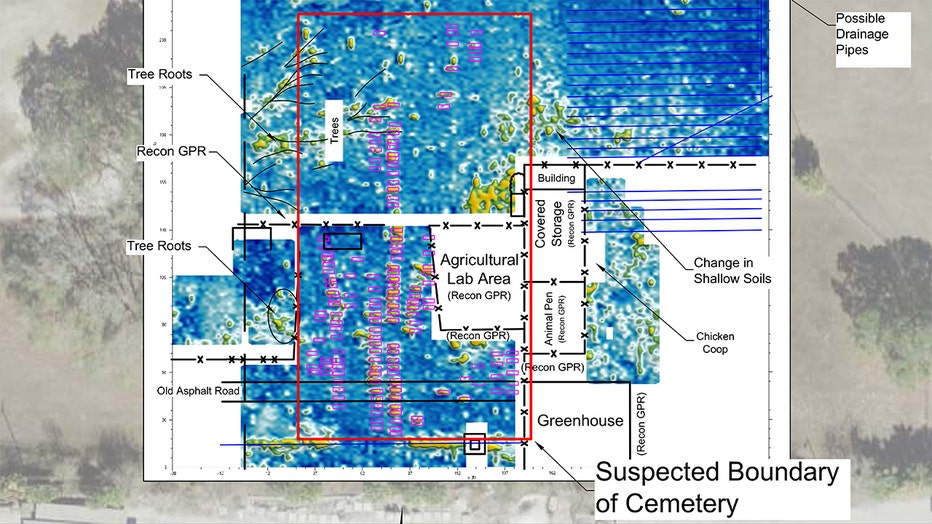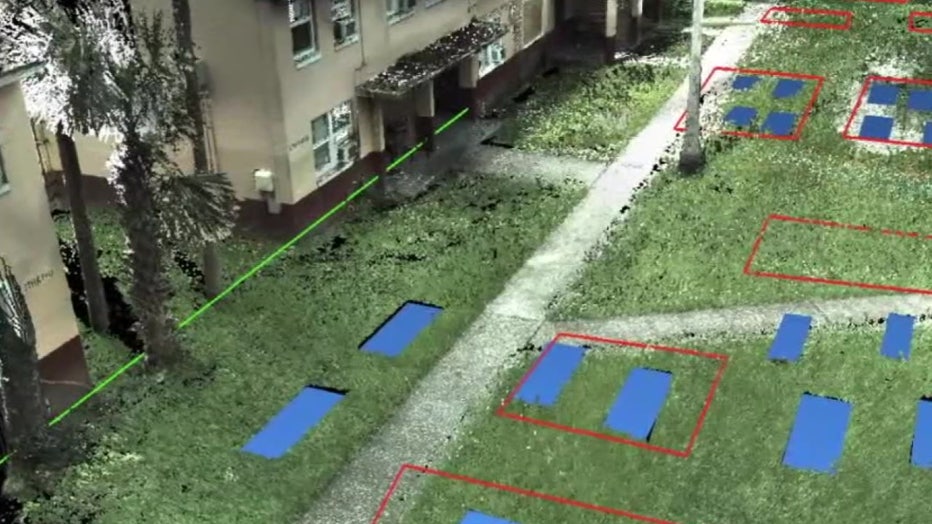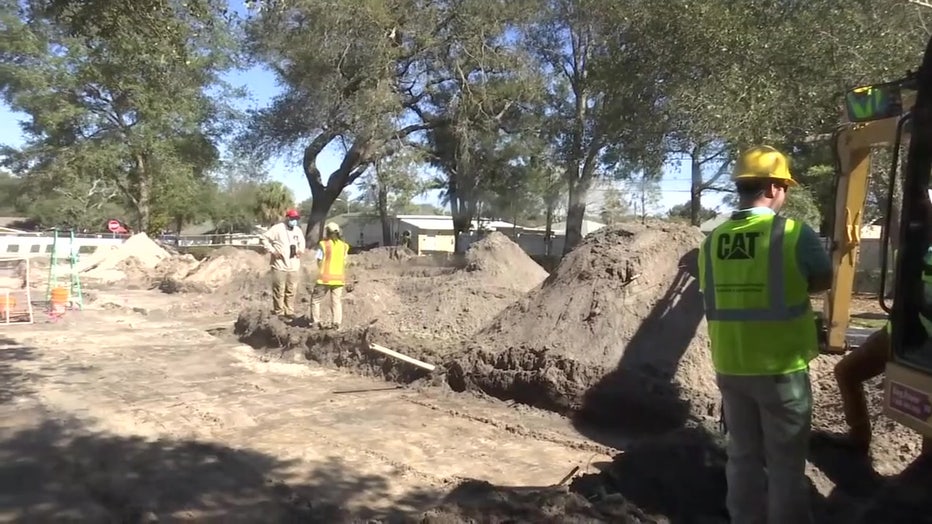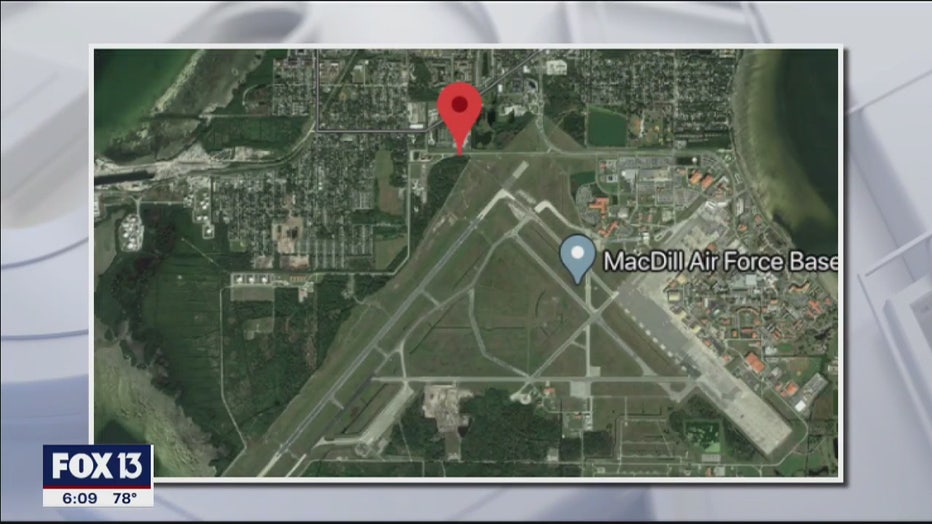State considers establishing department to find, honor lost cemeteries
TAMPA, Fla. - Lawmakers in Florida are moving the state another step toward grappling with its history of racial segregation, specifically regarding Black-only cemeteries that were covered over or otherwise ignored.
In 2020, it was confirmed that there are dozens of grave sites underneath a North Florida Avenue housing project built in the 1950s.
A number of additional sites have since been identified from Clearwater to Tropicana Field to MacDill Air Force Base, where it's likely hundreds of African American Floridians were laid to rest but never allowed to rest in peace.
A new bill in the state legislature is aimed at discovering and recognizing those sites, and honoring those whose graves were dishonored in the past.

Graphic showing possible Ridgewood Cemetery grave sites at King High School in Tampa
"Floridians can be assured that this is a priority of the state now and that it will continue to be in the future," said State Rep. Fentrice Driskell (D-Tampa).
Driskell and State Sen. Janet Cruz pointed to the Zion Cemetery as the one that got the ball rolling; 70 graves, likely from Florida's early 20th Century Jim Crow era, were found using radar technology at Robles Park.

Graphic showing possible location of grave sites at Robles Park
Soon, hundreds of grave sites were found under a Tampa schoolyard, then near MacDill Air Force Base, on private property in Clearwater, and even under a parking lot at Tropicana Field.
"Hopefully this is the start of the community coming together, after two communities lost a piece of their culture," said Zebbie Atkinson of NAACP Clearwater.
A task force has completed a report that recommends the state establish an office and hire staff to look after the recently discovered cemeteries, and investigate where others might be.

Crews search for possible grave sites at Frank Crum building
In the bill proposing th new office, landowners would be required to allow searches, conducted from the surface using radar, if credible evidence a cemetery might be underneath exists.
And when it comes to the future of the burial site or remains, the bill allows for activists to speak on behalf of those without findable living relatives. The bill also says markers should be placed at confirmed cemeteries.
"While we can not change the past, we can do our best in present times to remedy historical wrongs and secure the respect and dignity that is owed to every Floridian," said Driskell.

Google Maps marker shows possible site of graves at MacDill Air Force Base
The proposed office would also coordinate with the department of education to implement a program in public schools to teach students about the cemeteries and the discrimination that caused them.
"What we are trying to teach in terms of these abandoned cemeteries is actual, accurate, factual, Florida history," said Driskell. "It's not theory. It's about teaching the truth."
The newly created office would be tasked with helping locate any forgotten cemetery across the state, no matter the race of those buried there, because the lawmakers say there are likely many more.
PREVIOUS COVERAGE:
Zion Cemetery at Robles Park, Tampa
- Nearly 130 gravesites discovered underneath Tampa apartment complex
- Number of graves in forgotten Zion Cemetery increases to 300 after Florida Ave. discovery
- Search continues for more forgotten Zion Cemetery graves
- After more graves found at Zion Cemetery, leaders contemplate long-term plans
- USF researchers to begin searching for possible lost graves in Robles Park
Ridgewood Cemetery at King High School, Tampa
- 145 graves discovered on grounds of King High School in Tampa
- Hillsborough school officials review memorial plans for Ridgewood Cemetery unearthed at King High
- Hillsborough County leaders take next steps on Ridgewood Cemetery memorial
MacDill Air Force Base, Tampa
- There may be unmarked graves at MacDill Air Force Base, historians say
- MacDill ceremony honors long-lost African American cemetery
- Dogs trained to find bodies after thousands of years search for graves of African Americans at MacDill Air Force Base
All People’s Cemetery, Hillsborough County
Lincoln Cemetery, St. Petersburg
Tropicana Field, St. Petersburg
- Tropicana Field parking lot may be site of forgotten African American cemetery
- Radar identifies three possible graves under Tropicana Field parking lots
Frank Crum building, Clearwater
- Search for lost cemeteries moves across Tampa Bay
- Team maps Clearwater field in search of unmarked graves
- 124 graves from two Black cemeteries found in Clearwater
- Crews to begin search for graves at forgotten Black cemetery in Clearwater
- Archeologists find more African American graves on private land in Clearwater
Greenwood Cemetery at Curtis Fundamental and Palmetto Elementary School, Clearwater
- Researchers confirm discovery of 29 African American graves from Greenwood Cemetery in Clearwater
- Archaeologists find 44 possible unmarked graves from forgotten North Greenwood Cemetery
- Archaeologists continue work to investigate unmarked graves at Clearwater cemetery
- Graves from African American cemetery located on Pinellas County school property
- Engineers search for lost African American graves in Clearwater
Region/State
- Thousands of unmarked graves may be buried under homes and businesses
- Black Cemetery Network tracking lost African American graves across the country
- Students, city team up to restore Sarasota's first African-American cemetery
- USF archeologist map unmarked graves at Oaklawn Cemetery
- Researchers to look for more graves on grounds of Dozier school


